World Refugee Day: How a Congolese family found a new life in Kenya
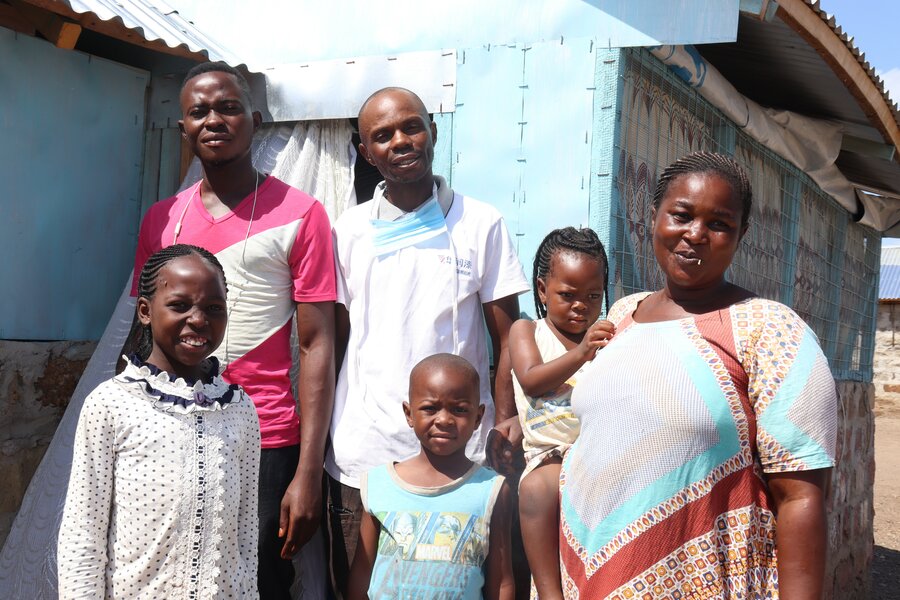
Story by Martin Karimi
"Rebels sporadically attacked homes, looting and killing people," says Kika Ngakani Dalida. "They attacked us one night — because they thought that my husband had cash on him. That is when we decided to leave for our safety."
The mother-of-three is a refugee living in the Kalobeyei settlement, in Turkana County, northwestern Kenya. She arrived here with her family in 2017, having fled violence in Beni in the eastern Democratic Republic of Congo (DRC).
‘If you haven't crossed the river, don't insult the crocodile.'
She and her family are among 10 million refugees supported by the World Food Programme (WFP) across the world. In 2019, persecution, conflict, violence, human rights violations or breakdowns of order forcibly displaced 79.5 million people, including 26 million who sought refuge abroad.
In Beni, Kika was a businesswoman, selling children's toys. Her husband, Péguy, previously worked as a lawyer but had decided to venture into mining and selling gold — that was why the family became the victims of an attack.
"Life was very difficult when we arrived here," says Kika. "Back home, we lived a good life, we lived in our own house, we had enough food — we could do anything we wanted."
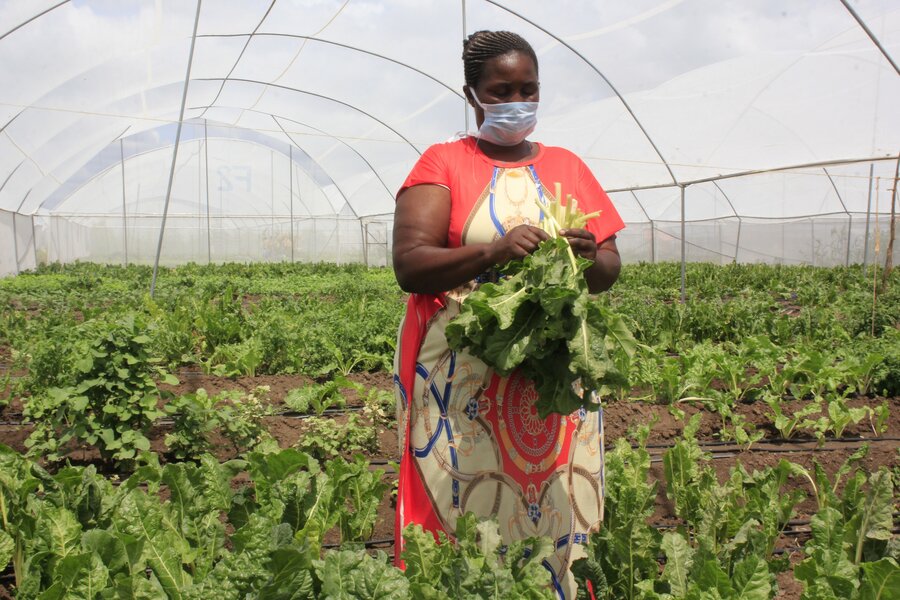
In Kalobeyei, WFP is working with partners including the Turkana County Government, the UN Refugee Agency (UNHCR) and the Food and Agriculture Organization of the United Nations (FAO), to provide avenues for 38,000 refugees, who receive cash assistance, to eventually become self-reliant. This work is supported by the European Union.
Through the agriculture livelihoods project, Kika has started learning a new set of skills. "I had never practised farming in my life, not even a backyard garden," she says. "I had to grab every opportunity that held a glimpse of a promise to a better life."
‘Wow — I'm flooded with overwhelming memories of home.'
Farming presented its own challenges. Kika planted sorghum for two seasons with little to show for it. She turned to vegetable farming, trying kale — which failed. With advice from WFP, she started planting cowpeas, then tomatoes and spinach. Today, she earns about US$70 a month selling veg.
"With the cash from the farm and the monthly transfers from WFP, I have gradually improved my new home. We can afford to buy meat once in a while," says Kika.
Life is a journey and Kika sums it by loosely quoting a Swahili proverb: "If you haven't crossed the river, don't insult the crocodile."
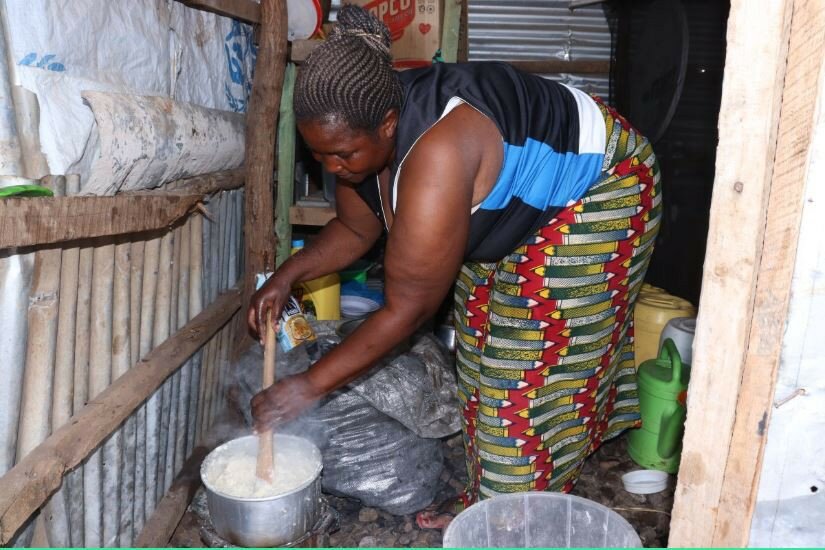
Speaking of her husband, she adds: "Money was not a problem. I would never have imagined him, the French-speaking lawyer, working alongside me on a farm, growing vegetables so that we feed our children!"
Kika and her husband are doing everything possible to make a good life for their two girls, aged 10 and 3, and their boy, aged 5.
"One of the things I truly miss about my home is being able to take the kids to a park for them to play," says Kika. "Back at home, we could afford to take time off for leisure."
Kika's husband Péguy is from DRC's Province Orientale where plantains are a staple.
"Our main meal in the evening was mashed plantain, served with fish or meat stew and green traditional vegetables," says Kika. "That was our favourite dish. I haven't seen plantain bananas since I left Congo, and here, the fish supply is very low. Fish is in plenty in Beni, though."
She adds: "The plantain is boiled in seasoning until fully cooked and mashed. When serving it with fish, I would make liboke [a Lingala word meaning packets]. The fish is wrapped in banana leaves, each fillet or piece on its own together with fresh spices — I particularly like garlic, ginger, nutmeg and sunflower — and steamed until cooked."
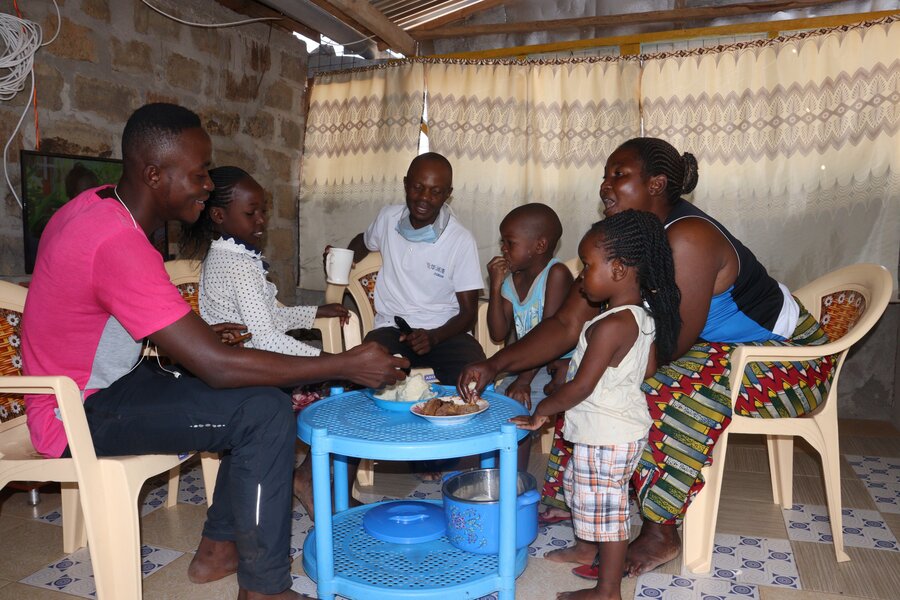
"Wow," says Kika, as she explains this recipe. "I'm flooded with overwhelming memories of home". For tonight, however, she and the family will have to settle for ugali (maize meal) with a stew of meat.
"WFP has immensely uplifted us — ever since this [communal] water pan was built, my life has completely changed," says Kika.
When the water pan opened to the farmers, Kika was among the 600 refugees and local farmers that started growing vegetables for consumption and later for sale. The vegetable gardens were followed by the construction of a horticulture farm irrigated through a drip system.
The transgender women in Colombia empowered by WFP assistance
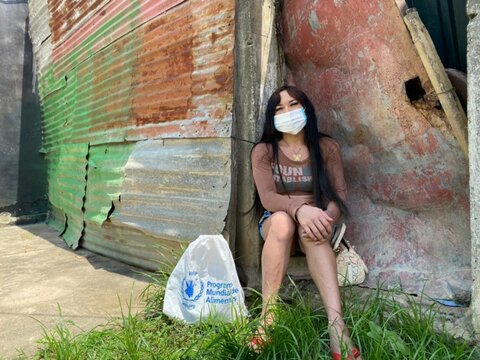
Kika and her husband both have plots here growing different types of vegetables. They sell to retailers directly from the farm or supply agencies, such as WFP, that run kitchens for staff.
Coronavirus has been detected in the adjacent Kakuma camps, home to 144,000 refugees. Residents in both in Kakuma and Kalobeyei are mainly from South Sudan (58 percent) and Somalia (18 per cent), with a minority coming from the DRC like Kika.
With the countrywide dusk-to-dawn curfew and decision by Kakuma-based agencies to limit movement to the camps as a safety precaution, Kika and other traders say business is slowing down.
"Many people are not working and we are getting fewer clients of late," she says. "But together with my husband, we cannot fail to get 500 or 600 [Kenyan] shillings in a day [around US$ 5], and with that we are able to feed our children."
Kika and her family may not have liboke, just now, but they are guaranteed a healthy, nutritious meal.
